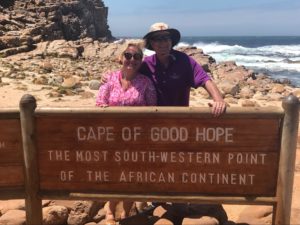National Women’s Day is a public holiday in South Africa celebrated annually on August 9th. On this day in 1956 approximately 20,000 women of all races marched to Pretoria’s Union Buildings to protest against the Urban Areas Act of 1950. The Urban Areas Act required South Africans defined as black under The Population Registration Act to carry an internal passport or pass that would maintain segregation, control urbanization, and manage migrant labor during apartheid. In 2006, a reenactment of this march occurred for the 50th anniversary, with many 1956 march veterans participating.
The 1956 protest march of 20,000 women was led by Helen Joseph, Rahima Moosa, Lilian Ngoyi, and Sophia Williams. These protestors deposited 14,000 petitions with 100,000 signatures at the prime minister’s office doors and held a 30-minute silent protest. After the silence, they sang a song composed specifically for the event, titled “Wathint’Abafazi Wathint’imbokodo” which translates to “Now you have touched the women, you have struck a rock.”
Due to this peaceful protest, National Women’s Day was created in South Africa, and made a holiday in 1995. Challenges faced by African women then and now, include domestic violence, workplace sexual harassment, unequal pay, blocked education, and no-help parenting. In the next section, we answer some frequently asked questions about this holiday.
What is the difference between National Women’s Day on August 9 and International Women’s Day on March 8?
The goal of both days is identical, which is to empower women. However, National Women’s Day is focused on the liberation and empowerment of South African women, while International Women’s Day has a broader demographic that encompasses all global women.
Is it appropriate to celebrate National Women’s Day if I’m not South African or if I’m not a woman?
Yes, to both questions. It is an excellent opportunity to celebrate South African women and all of their accomplishments. Celebrating honors the past and looks to the future.
What are some ways to celebrate South Africa’s National Women’s Day?
- Hold a virtual watch party of a televised reenactment with supportive friends
- Attend or observe a scheduled reenactment in a city near you
- Create your own respectful reenactment
- Share this blog on social media to honor the history
Sharon Schweitzer, J.D., is a diversity and inclusion consultant, cross-cultural trainer, etiquette expert, and the founder of Access to Culture. In addition to her accreditation in intercultural management from the HOFSTEDE Centre, she is an attorney and mediator. Her Amazon #1 Best Selling book in International Business, Access to Asia, won a coveted Kirkus Star, and was named to Kirkus Reviews’ Best Books. She is a winner of numerous awards, including the British Airways International Trade Award at the Greater Austin Business Awards.
#NationalWomensDay, #SouthAfrica’sNationalWomen’sDay, #CelebrateWomen, #CelebrateSouthAfricanwomen, #gratitudeforwomen, #respectforwomen, #Pretoria, #NationalSouthAfricanholidays, #SouthAfricancelebrations, #SharonSchweitzer, #interculturalcommunication, #crossculturaltrainer, #globalacumen, #culturalintelligence, #modernmanners, #businessetiquette, #etiquette #History #Herstory



Leave A Comment